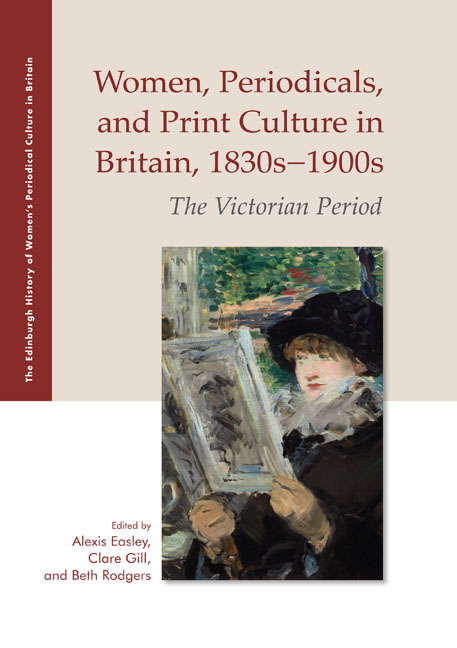Book contents
- Frontmatter
- Contents
- List of Illustrations
- Acknowledgments
- Introduction: Women, Periodicals, and Print Culture in the Victorian Period
- Part I (Re)Imagining Domestic Life
- Part II Constructing Modern Girls and Young Women
- Constructing Modern Girls and Young Women: Introduction
- 7 Promoting a Do-It-Yourself Spirit: Samuel Beeton's Young Englishwoman
- 8 Claiming Medicine as a Profession for Women: The English Woman's Journal's Campaign for Female Doctors
- 9 Encouraging Charitable Work and Membership in the Girls’ Friendly Society through British Girls’ Periodicals
- 10 ‘Welcome and Appeal for the “Maid of Dundee”’: Constructing the Female Working-Class Bard in Ellen Johnston's Correspondence Poetry, 1862–1867
- 11 The Editor of the Period: Alice Corkran, the Girl's Realm, and the Woman Editor
- 12 The ‘Most-Talked-Of Creature in the World’: The ‘American Girl’ in Victorian Print Culture
- Part III Women and Visual Culture
- Part IV Making Space for Women
- Part V Constructing Women Readers and Writers
- Part VI Intervening in Political Debates
- Notes on Contributors
- Index
- Plate section
8 - Claiming Medicine as a Profession for Women: The English Woman's Journal's Campaign for Female Doctors
from Part II - Constructing Modern Girls and Young Women
Published online by Cambridge University Press: 25 October 2019
- Frontmatter
- Contents
- List of Illustrations
- Acknowledgments
- Introduction: Women, Periodicals, and Print Culture in the Victorian Period
- Part I (Re)Imagining Domestic Life
- Part II Constructing Modern Girls and Young Women
- Constructing Modern Girls and Young Women: Introduction
- 7 Promoting a Do-It-Yourself Spirit: Samuel Beeton's Young Englishwoman
- 8 Claiming Medicine as a Profession for Women: The English Woman's Journal's Campaign for Female Doctors
- 9 Encouraging Charitable Work and Membership in the Girls’ Friendly Society through British Girls’ Periodicals
- 10 ‘Welcome and Appeal for the “Maid of Dundee”’: Constructing the Female Working-Class Bard in Ellen Johnston's Correspondence Poetry, 1862–1867
- 11 The Editor of the Period: Alice Corkran, the Girl's Realm, and the Woman Editor
- 12 The ‘Most-Talked-Of Creature in the World’: The ‘American Girl’ in Victorian Print Culture
- Part III Women and Visual Culture
- Part IV Making Space for Women
- Part V Constructing Women Readers and Writers
- Part VI Intervening in Political Debates
- Notes on Contributors
- Index
- Plate section
Summary
IN 1849, ELIZABETH BLACKWELL (1821–1910) successfully graduated from Geneva Medical College in New York to become the first female MD in America. News of her success reverberated in England and inspired various reflections on women's roles in medicine. Punch, a comic weekly, published a celebratory poem entitled ‘An M.D. in a Gown,’ which encouraged young English women to follow the ‘example … of excellent Miss Blackwell,’ if only so that they could cure family members at home, saving their husbands, brothers, and fathers the trouble and expense of consulting professional physicians (2 June 1849: 226). In sharp contrast, Bessie Rayner Parkes, the future editor of the English Woman's Journal (1858–64) and a prominent member of the mid-century feminist group focused on widening women's employment opportunities, saw Blackwell as opening a new career path for educated women. As Parkes observed in a letter to her friend Kate Jeavons, ‘A Miss Eliz Blackwell, cousin of a friend of mine … has just taken a degree of medicine with some éclat in one of the American Colleges…. I heartily wish her success…. Why should such a lucrative profession as medical attendance on their own sex be denied women, as a matter of delicacy it is certainly preferable’ (8 Mar 1849).
This concern about the impropriety of male doctors treating women was also voiced by several mid-century opponents of male midwives. However, unlike them, Parkes did not seek to merely reinstate female midwives, who had increasingly lost ground to male accoucheurs since the eighteenth century (Donnison 1977: 21–3). Rather, she wanted female doctors to acquire the same medical training as qualified male doctors and to attend to not only childbirth but also various other diseases of women and children. Contrary to Parkes's claim, at mid-century the propriety of women becoming doctors was far from certain. British universities and medical schools did not grant degrees to women until 1878, partly because university education in general was considered too strenuous for women and a medical education even more so due to its reputation for coarseness (Witz 1992: 94). It was feared that the study of anatomy and dissection, which had become a critical component of medical training by 1850, would obliterate female sensibilities.
- Type
- Chapter
- Information
- Women, Periodicals and Print Culture in Britain, 1830s–1900sThe Victorian Period, pp. 120 - 139Publisher: Edinburgh University PressPrint publication year: 2019

